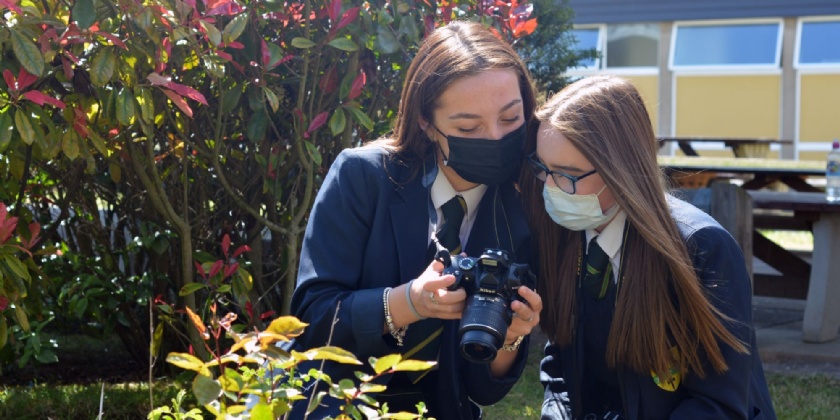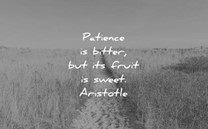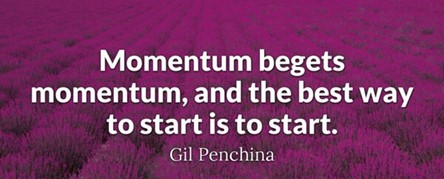April 2021 Blog

It feels like Spring has finally sprung (metaphorically as the weather is still freezing outside) and we are beginning to see the College come back to life after a year of disruption, bubbles, one-way systems, and endless risk assessments.
That is not to say that these do not still dominate our everyday existence, but our patience and our endurance with all the challenges presented to us as a community are beginning to pay off. National infection and hospital admission rates are low and under control, so the government road map out of lockdown can proceed.

With this good news, we can increasingly take small steps towards normality within the College, not experienced for over a year, enabling us to offer so much more to the students, beyond the vital academic learning.
Much of April has been focused on the preparations for Year 11 to leave us. This has involved the very detailed, intense, and thorough CAG (Centre Assessed Grades) process. The students have been brilliant at rising to the challenge of the weekly assessments, and we are well down the road across all subjects with regard to having strong portfolios of evidence.
In addition, we have worked very hard on the transition programme for the Year 11’s for after the Summer half-term. This transition programme has been personalised to each individual student depending on the post 16 route they are taking next year. Clare Mack (Head of Careers and STEM) has created this transition programme to focus on the following areas over three weeks of June:
Week one: Students have a remote learning package linked to the further education College they have applied to attend next year and the specific courses they are planning to take. Alongside this, students will have face-to-face sessions in College to meet with their Year 11 teachers and go through their individual portfolio of evidence in each of their GCSE subjects, so they are absolutely clear about the evidence being submitted.
Week two: Alongside the continued remote learning linked to their future course, the students have got a number of face-to-face sessions in College with teachers who have agreed to run taster sessions to bridge the gap between their KS4 course and their KS5 learning. A table of these taster sessions can be seen below:
| Subject | Staff / Department | Date / Time |
|---|---|---|
| Dance / Drama | HEC / JAG | Wednesday 16th June Lesson 2 |
| Music | CA | Wednesday 16th June Lesson 1 |
| Engineering | AIM |
Tuesday 15th June Lesson 4 & 5 (2 groups due to numbers) |
| Construction | RST |
Tuesday 15th June Lesson 4 & 5 (2 groups due to numbers) |
|
Games Design / IT (1 joint lesson) |
CMM | Tuesday 15th June Lesson 1 |
| Business | NKB | Tuesday 15th June Lesson 5 |
|
Criminology / Law / Re (1 joint lesson) |
PJJ | Friday 18th June Lesson 1 |
|
Sociology / Psychology (1 joint lesson) |
ZM | Tuesday 15th June Lesson 4 |
| English | TSB | Thursday 17 June Lesson 4 |
| History / Classical Civilisation (1 joint lesson) | VLM | Wednesday 16th June Lesson 2 |
| Sport | CCW | Friday 18th June Lesson 1 |
|
Photography / Media (1 joint lesson) |
AJB | Monday 14th June Lesson 2 |
| Animal Care | RJF / CM | Thursday 17th June Lesson 1 |
| Science | SPR | Thursday 17th June Lesson 1 |
|
Healthcare / Childcare (1 joint lesson) |
KIB | Friday 18th June Lesson 1 |
| Art | DJH | Wednesday 16th June Lesson 1 |
| Graphics | JB | Monday 14th June Lesson 2 |
| Geography | BHE | Tuesday 15th June Lesson 4 |
|
Maths / Accounting (1 joint lesson) |
MMP | Wednesday 16th June Lesson 3 |
| Hospitality and Tourism | JM | Monday 14th June Lesson 2 |
| Hair and Beauty | VKM / CM | Tuesday 15th June Lesson 2 |
I am so grateful to all the staff who have agreed to help with these sessions as I feel it will make a significant difference to our students and their confidence as they get ready for the next stage of their learning.
Week three: The students will be completing some careers work developed by Clare Mack whilst at home, but there will be a session for our students who are going on to an apprenticeship on the Thursday afternoon, run by Clare Mack, to help get them ready for the rigours of their next stage.
Each student has received a personal timetable with the specific links inserted for their further education college and the transition package for their chosen subject as well as the times the student is required in College either for their one to one with their different subject teachers for the evidence portfolios or for their taster sessions. It has been a significant job to pull all this together, and it is fantastic that so many staff members want to ensure that our students have the best transition possible to post 16 and are not disadvantaged in any way. In fact, with such a strong transition package, I think this cohort of leavers will be at a significant advantage over previous cohorts.
I am also delighted that, as it stands at the moment, we are planning to put on a Prom for the Year 11 students who are eligible and wish to attend. Hopefully, after such a difficult year, this will be a chance to celebrate the end of this stage of their education and the start of the next and the rest of their future in front of them.
April has also been a busy month for option choices across Years 8-10. The Year 8 options process got underway in January, and in the last few days of April, all the one-to-one interviews with each Year 8 student about their choices were completed. After the Easter break, we also started the standard option choices for Year 9, whereby they drop one of their option subjects going forward into Year 10 and 11. For Year 10, we have made the decision again this year to drop an option choice as the students progress into Year 11. After such significant disruption to education and their GCSE programme, we feel that reducing the number of subjects the students will be examined in next year will help manage stress and anxiety levels. All students will still leave at the end of Year 11 with a minimum of 8 GCSEs. The extra curriculum time gained through doing one fewer subject in the final year is shared out amongst the other remaining option subjects, thus giving the students the absolute best opportunity to excel in all their subjects despite the prolonged periods of school closure and reliance on remote education.
Central to our daily discussions and actions is our strategic focus: taking into account all external forces, we are making constant adjustments to it in order to deliver what is truly best for each year group.
You can’t beat a pandemic for keeping the brains of all leaders within the College, fully exercised with trying to find the best possible solutions to unprecedented situations.
A great example of this beyond the curriculum is with our growing extra-curricular programme. Over 20 staff members have volunteered to run a club for different Year groups, so we can maintain our essential bubbles. Below is the current table of all the activities that students in different year groups can engage in:
Monday
- Creative Writing Club — Year 10 — Mrs Renshaw — Library.
Wednesday
- Dance Club — Year 7 — Miss Grundy — Theatre
- Science Club — Year 7 — P4 — LUNCHTIME
- Community Action Club– Year 7 — Mrs Jones / Miss Crosbie — Lunchtime — G3
- Football Club — Year 7 — Mr Baker — Field
- Basketball Club — Year 7 — Mr Watson — Sports Hall
- Football Club — Year 8 — Mr Blakey — Field
- Rugby Club — Year 8 — Miss Shrimpton — Field
- Running Club — Year 8 — Mr Carver — Meet in the gym
- Gymnastics Club — Year 8 — Mrs Ainslie — Gym
- Poetry Club — Year 9 — Mrs Nailor — A9
- Book Club — Year 9 — Mrs Barrick — A7
Thursday
- Choir — Year 7 — Mrs Miles / Mrs Callaghan — Upstairs Music room
- Virtual History — Year 7,8,9 — Mrs Masson
- Netball Club — Year 7 — Miss Shrimpton — Courts
- Dance Club — Year 8 — Miss Grundy — Theatre
- Drama Club — Year 8 — Mrs Donnelly — Drama Studio
- Art Club — Year 10 — Mr Harrison — P11
Friday
- Gymnastics Club — Year 7 — Mrs Ainslie — Gym
- Running Club — Year 7 — Mr Carver — Meet in the Gym
- Badminton Club — Year 9 — Mr Baker — Sports Hall
- Textiles Club — Year 9 (WEEK A ONLY) — Mrs Pitassi
- Tennis Club — Year 11 (Please use P.A changing rooms) — Mr Collins — Courts
It has been great over recent weeks to see the numbers of students engaging in these activities, all of which can be signed up for on a weekly basis in the ‘its learning’ student zone.
Subjects are also beginning to develop their own subject enrichment pages with lots of activities on that students can choose to engage with to increase either, their love of the subject or their depth of understanding around a particular topic. In my last blog, I referenced the philosophy competition that 4 of our students entered via the RE enrichment page. I was delighted when Mrs Jones informed me that Alisha E.’s entry had come 7th overall nationally, with particular reference made to the strength of her closing arguments, which just proves the power of an effective conclusion. Alisha’s fantastic entry is included at the end of this blog.
Taking part in these activities is a great way to grow students’ confidence again and broaden their horizons after such a long time of isolation.
As we go through May in this first half of the summer term, there is more for us to look forward to, such as the Year 11 music performances on Friday 7th May and the start of the competitive House events, such as the rounders which is currently underway. Momentum towards normal grows and grows…

What would happen if God was confirmed to exist?
by Alisha .E
A question perhaps not commonly answered, but frequently asked. What would happen if God was confirmed to exist? Atheists, theists, and agnostics alike have all pondered the reality of what the world would be like if God was proved to be entirely true, yet most fear to ask it. Nevertheless, it is a question that must be answered, to rest minds all over the world.
On one hand, Dawkins, a famous and distinguished atheist, says ‘a supernatural creator, God, almost certainly does not exist, and belief in a personal god qualifies as a delusion, which defines as a persistent false belief held in the face of strong contradictory evidence.’ He would clearly argue that it is a question which does not need to ever be asked, as it would never happen. He says that religion was created from a story and manipulated merely for reassurance. One fear that everybody on this Earth possesses is the fear of the unknown. As humans, we are genetically programmed to want to discover, to thrive and be aware of our surroundings. But the truth is, we don’t know everything. In fact, there is so much that we have yet to learn, and this scares us. We’re frightened of not knowing these things, and so we allegedly formed a theory, an astonishing theory, that makes us feel better about ourselves and the world around us. Therefore, we needn’t speak of probabilities of a God existing, because one most certainly doesn’t.
Transparently, Criss Jami, a famous agnostic, says ‘The whole war between the atheist and the theist comes down to this: the atheist believes a 'what' created the universe; the theist believes a 'who' created the universe.’ – this could also lead to the debate of which ‘who’ created the universe, too. Jews and Muslims disagree with Christians about the spirituality of Jesus; Protestants disagree with Catholics about the purity of Mary; Protestants disagree with Protestants about destiny, newborn baptism, and the faultlessness of the Bible. Hindus believe there are numerous gods while Unitarians think there is a maximum of one. However, if the entire world’s atheists, theists, and agnostics could be persuaded that holy beings exist and one religion is the correct belief, there’d be an entirely separate problem about how many beings there are and what those beings are like.
Furthermore, Pope Francis says ‘St. Peter committed one of the greatest sins, denying Christ, and yet they made him pope. Think about that.’ – he speaks of atheism and how one can still be holy. This presents the idea that perhaps you do not have to believe in God to go to heaven, and even those who are atheists can be seen as worthy by God. He would also argue that we have been doing wrong since the very beginning. ‘So many Christians are like this, and these people scandalize others,’ Francis said. ‘How many times have we heard -- all of us, around the neighbourhood and elsewhere -- 'But to be a Catholic like that, it's better to be an atheist.' It is that: scandal.’ He implies that conflict that has risen from diverse religions has been, in itself, unintended by whatever God may exist. And, if God was proved to exist, with their supposedly omnipotent nature would perhaps punish those who do not follow, yet with their omni benevolence love those who do not follow equally with those who do, and punish those who do follow them for making worship for them impact negatively on others through riots and wars.
In conclusion, amongst the world’s most defining struggles, determining evidence for God may be the largest. But should such evidence appear, it might, in turn, present the demolishment of religion indefinitely. Proof for God could scatter the world’s religions into panic - evidence of God would be devastation within atheists. I believe that the idea of God is not only farfetched but also unpleasant — the thought of a being watching over you constantly has commonly created shivers of discomfort for many agnostics and atheists. If this being did present itself to us, we could see atheists start a revolution against God, and numerous arguments in what form the being wants worship would arise. Undoubtedly, conflicts would become wars, laws would change and wars would break those laws, as said in the bible in the famous phrase, “love thy neighbour”. It would be a dramatic challenge in society should a God arise, and it could, perhaps, lead to the end of society as we know it. If God could arise in any quantity of appearances, whatever this being turned out to be would be implausible to fit our strong variation of existing notions. Therefore, if God was proved to exist, society would surely collapse.
